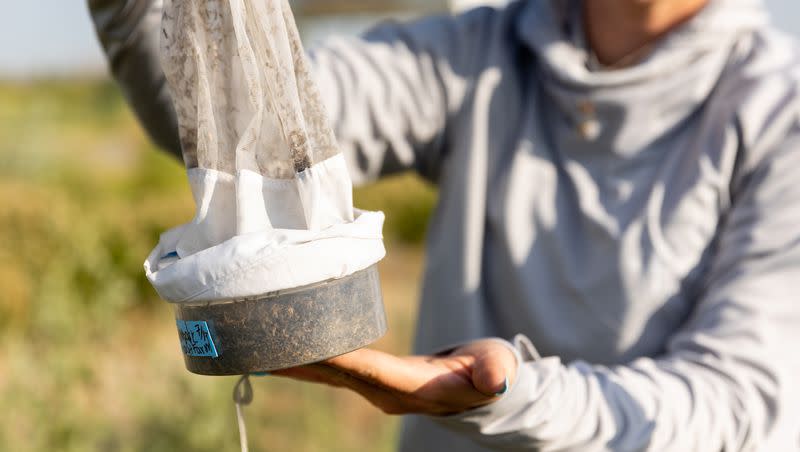Summer may be almost over, but mosquito season is still going strong

Summer may be winding down, but mosquitoes are still out in force.
Now isn’t the time for Utahns to let down their guard against the pesky insects that are especially abundant this year, thanks to record-breaking storms, the Utah Department of Health and Human Services warned.
“Mosquito season isn’t over and Utahns should continue to protect themselves from mosquito bites,” advised Kacy Nowak, the department’s vector-borne/zoonotic epidemiologist.
Mosquitoes spread diseases, including West Nile virus and, for the first time in two decades in the United States, malaria. Locally acquired malaria has been detected in at least three states — Florida, Texas and Maryland — but not in Utah.
Related
Only about 12 of the more than 200 mosquito types found in the continental U.S. can make people sick, according to the department, including some of the 50 different species found in Utah.
Mosquito-borne illness in Utah
So far, two cases of West Nile virus have been diagnosed this year in Utah: one in the region served by the TriCounty Health Department, Daggett, Duchesne and Uintah counties, and the other in the counties served by the Weber-Morgan Health Department.
But as of Wednesday, the virus has been identified in 170 mosquito pools throughout the state, in Bear River, Davis, Duchesne, Grand, Millard, Salt Lake, Tooele, Uintah, Utah, Washington and Weber counties.
On Friday, the Weber Mosquito Abatement District reported three more sites had tested positive for the week ending Aug. 27, in Roy, Ogden and North Ogden. The district said efforts to spray for mosquitos in those areas will be increased.
West Nile virus has shown up in a horse in Garfield County and another in Duchesne County. A sage grouse in Wasatch County has also tested positive, and mosquitoes that carry another disease, St. Louis encephalitis, have been found in southwest Utah.
In 2022, the department reported five cases of West Nile virus in the state, with no deaths. Utah has seen an average of 25 human cases of the virus annually since surveillance started in 2003, but only one case of St. Louis encephalitis, in 2016.
Nowak said preventing bites is key.
“Many more Utahns could become ill with an illness carried by mosquitoes if they don’t take precautions to protect themselves from mosquito bites,” she said, noting only about 20% of those infected with an illness will have flu-like symptoms.
Fewer than 1% end up with a serious, potentially deadly illness after being bitten, Nowak said.
Related
Although the risk is greater for people 60 and older as well as those with some medical conditions, she said anyone with symptoms of a mosquito bite illness, such as high fever, severe headache, stiff neck, disorientation and confusion, should seek medical care.
How Utahns can keep mosquitos from biting
Here’s what the state says Utahns should be doing to protect themselves against mosquito bites:
Using insect repellent outdoors. Repellents containing 20% to 30% DEET are recommended and safe to use during pregnancy.
Limiting outdoor activities from dusk to dawn, when mosquitoes are most active, especially for the first two hours after sunset.
Wearing pants and shirts with long sleeves as well as socks when outside in areas where mosquitoes are active.
Draining and removing sources of standing water, including pet dishes, flower pots, wading pools, backyard ponds, buckets, tarps, tires and puddles, at least once a week.
Reporting bodies of stagnant water to local mosquito abatement districts.
Keeping doors and windows shut, and screens in good condition.

